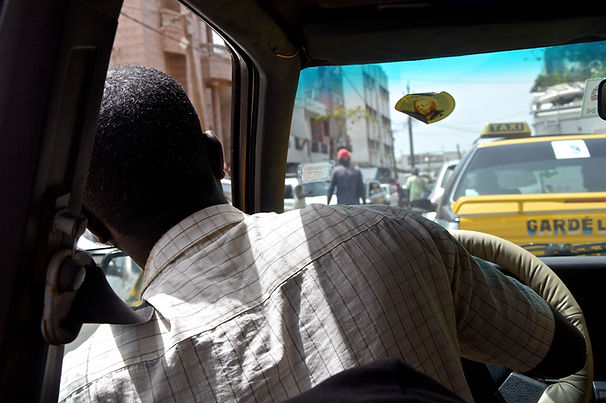


WITHOUT NEGOTIATION, 2018
Installation including exhibit cases, video and photographs
Variable dimension
Caught up in an endless game of survival, between continents, the state and its economy, ambulant street vendors have become an inherent part of metropolitan landscapes. Aiming to return these transitory figures to the map, Younes Baba-Ali’s first work on hawkers, "Vu’cumprà", portrayed the stories of Naples’ ambulant vendors. "Vu’cumprà", “You buy?” in an Neapolitan dialect spoken by African and South-Asian immigrants, is the pejorative term used to label Naples’ peddlers. The project itself illuminates the shadowside of Italy’s economy and it’s ties to global migration. For the project "Without Negotiation", Younes Baba-Ali takes to Dakar’s dusty downtown streets, crowded with hustlers and traders, bargainers and touts. The bustling, kaleidoscopic streets of the Senegalese capital are the daily arena of thousands of ambulant vendors; a group made up of a myriad of nationalities and social backgrounds, where students, bachelors and unemployed graduates intermingle with illiterates and refugees. Whether one is slinging handbags or plastic chairs, candied peanuts or sunglasses does not matter – vending is for those who are tough. Practicing the art of survival and craft of winning, the ingenious vendors reinvent new ways of selling their goods on the daily, to get an edge in business and be one step ahead of the pack.
Circulating through the city by taxi while accepting any offer made to him when stopped at red lights, Baba-Ali aims to disrupt, map and document a system where negotiation is the lingua franca and only the most hardened bargainers thrive. Confined to grubby roadsides, to the periphery of the official market, these vendors’ usual habitat seems a far cry from the carefully curated venues of the Dakar Biennale. By redistributing cultural funds in Dakar’s shadow economy, however, Baba-Ali blurs the two seemingly contrasting worlds and hints at the tension and parallels between them. He exposes how this shadow economy, inherent to nearly all industries, intersects with the art world where the concept of an informal economy and the art of negotiation is not foreign to anyone involved. Black and white economies are blended into a gray zone, valuation of art spills over into the ambulant market. By displacing and exposing the accumulated objects on a pedestal, carefully placed in exhibit cases as if displaced from a natural history museum, Baba-Ali, as an artist-turned-anthropologist, reveals how value is created through exchange, display, circulation and consumption of both objects and artworks, in a game where worth has no meaning in and of itself.
Detached from the dusty streets, the objects resemble collectibles; valuable and difficult to find. If the public ends up ascribing aesthetic or artistic value to the objects turned readymades, whereas their purchase was informed by aesthetic indifference, they prove to be an effective case study. Now floating in between worlds, brought back into an old Malian market turned temporary exhibition space, the objects balance between commodity phases. Through the language of aesthetics, Baba-Ali holds up a mirror to the city and the art world by exposing their ingrained habits, dysfunctions and shadowsides.
Text by Aude Tournaye